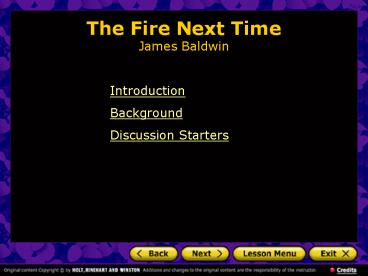The Fire Next Time James Baldwin - PowerPoint PPT Presentation
Title:
The Fire Next Time James Baldwin
Description:
Images provided by Index Open, Jupiter Images, Shutterstock, and the Granger ... Robert F. Kennedy, one of the movement's most important political figures, was ... – PowerPoint PPT presentation
Number of Views:512
Avg rating:3.0/5.0
Title: The Fire Next Time James Baldwin
1
The Fire Next TimeJames Baldwin
Introduction Background Discussion Starters
2
The Fire Next TimeJames Baldwin
- Images provided by Index Open, Jupiter Images,
Shutterstock, and the Granger Collection.
3
The Fire Next TimeJames Baldwin
4
The Fire Next Time Introduction
If the world expects you to act a certain way,
should you live up to its expectations? Or can
you find a way to be yourself?
5
The Fire Next Time Introduction
The Fire Next Time is a series of essays written
by James Baldwin in the early 1960s.
In the first essay, Baldwin writes a letter to
his fifteen-year-old nephew.
He is worried about his nephews future.
6
The Fire Next Time Introduction
In the 1960s, it is very difficult to be a young
African American man.
Many African Americans find living in America
frustrating and humiliating.
There is much prejudice.
There is much discrimination.
7
The Fire Next Time Introduction
In his own youth, Baldwin faced a similar crisis
about who he could be in America.
He feared and hated his father.
He didnt know what to do with his life.
8
The Fire Next Time Introduction
He knew what America expected him to become
a man living in poverty
an angry, violent African American man on the
streets. Lost.
9
The Fire Next Time Introduction
But Baldwin believed African Americans should not
accept this version of their identity,
and that they should work for an America in which
everyone is equal.
10
The Fire Next Time Background
Baldwin uses the one-hundreth anniversary of the
Emancipation Proclamation as a way to introduce
his concerns to his nephew.
In 1863, President Lincoln had proclaimed all
African American slaves free.
11
The Fire Next Time Background
But freedom from slavery was not the same as
freedom from prejudice, oppression, segregation,
and hatred.
African Americans faced all kinds of public and
private discrimination in the years after the
Civil War.
12
The Fire Next Time Background
In the 1950s and 1960s, however, leaders emerged
to push the issue of civil rights as never
before. Important events included
1955 Rosa Parks refuses to give up her seat on a
segregated bus.
1963 Martin Luther King, Jr., gives his famous
I Have a Dream speech.
13
The Fire Next Time Background
James Baldwin was part of this civil rights
movement.
His works speak openly about the causes and
effects of racism and encouraged people to
confront and discuss these issues.
14
The Fire Next Time Background
In 1964, the Civil Rights Act was passed, which
gives equal access to public places. It also
prohibits discrimination in employment.
The Voting Rights Act of 1965 outlawed the poll
tax and other methods intended to discriminate
against voters.
15
The Fire Next Time Background
Yet despite these gains, the struggle for full
civil rights continued
and resulted in conflict and violence as well as
progress.
16
The Fire Next Time Background
In 1968, Martin Luther King, Jr., was
assassinated. Robert F. Kennedy, one of the
movements most important political figures, was
also assassinated.
By the end of the 1960s, many civil rights
efforts turned violent as race riots erupted in
major cities.
17
The Fire Next Time Discussion Starters
- Discuss (1)
- How did the Civil Rights movement of the 1960s
change American society? - How has American society changed since? How have
these changes affected relationships between
races?
18
The Fire Next Time Discussion Starters
- Discuss (2)
- Do you think racial stereotypes still exist in
the United States? - If so, how are people working to overthrow these
stereotypes?






























